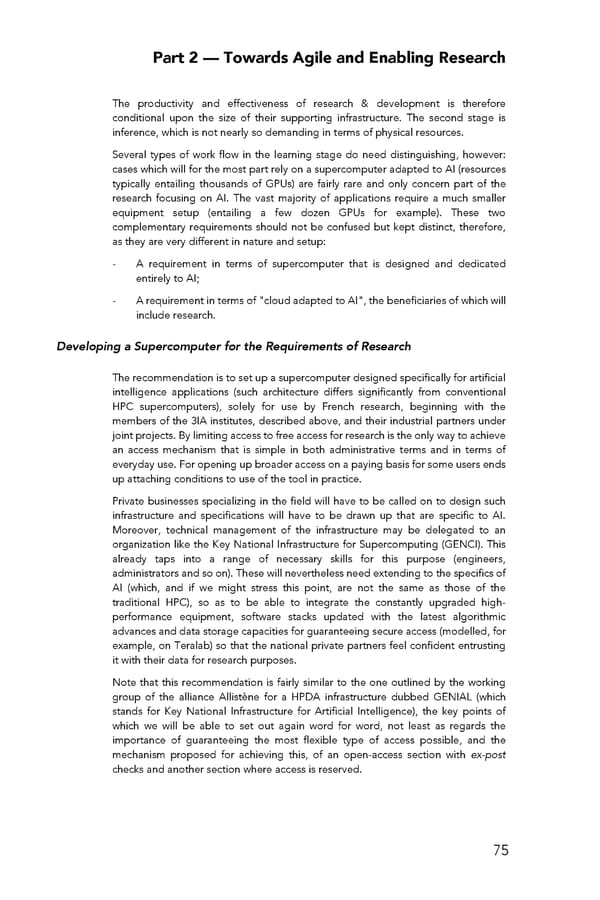Part 2 — Towards Agile and Enabling Research The productivity and effectiveness of research & development is therefore conditional upon the size of their supporting infrastructure. The second stage is inference, which is not nearly so demanding in terms of physical resources. Several types of work flow in the learning stage do need distinguishing, however: cases which will for the most part rely on a supercomputer adapted to AI (resources typically entailing thousands of GPUs) are fairly rare and only concern part of the research focusing on AI. The vast majority of applications require a much smaller equipment setup (entailing a few dozen GPUs for example). These two complementary requirements should not be confused but kept distinct, therefore, as they are very different in nature and setup: - A requirement in terms of supercomputer that is designed and dedicated entirely to AI; - A requirement in terms of "cloud adapted to AI", the beneficiaries of which will include research. Developing a Supercomputer for the Requirements of Research The recommendation is to set up a supercomputer designed specifically for artificial intelligence applications (such architecture differs significantly from conventional HPC supercomputers), solely for use by French research, beginning with the members of the 3IA institutes, described above, and their industrial partners under joint projects. By limiting access to free access for research is the only way to achieve an access mechanism that is simple in both administrative terms and in terms of everyday use. For opening up broader access on a paying basis for some users ends up attaching conditions to use of the tool in practice. Private businesses specializing in the field will have to be called on to design such infrastructure and specifications will have to be drawn up that are specific to AI. Moreover, technical management of the infrastructure may be delegated to an organization like the Key National Infrastructure for Supercomputing (GENCI). This already taps into a range of necessary skills for this purpose (engineers, administrators and so on). These will nevertheless need extending to the specifics of AI (which, and if we might stress this point, are not the same as those of the traditional HPC), so as to be able to integrate the constantly upgraded high- performance equipment, software stacks updated with the latest algorithmic advances and data storage capacities for guaranteeing secure access (modelled, for example, on Teralab) so that the national private partners feel confident entrusting it with their data for research purposes. Note that this recommendation is fairly similar to the one outlined by the working group of the alliance Allistène for a HPDA infrastructure dubbed GENIAL (which stands for Key National Infrastructure for Artificial Intelligence), the key points of which we will be able to set out again word for word, not least as regards the importance of guaranteeing the most flexible type of access possible, and the mechanism proposed for achieving this, of an open-access section with ex-post checks and another section where access is reserved. 75
 For a Meaningful AI - Report Page 75 Page 77
For a Meaningful AI - Report Page 75 Page 77